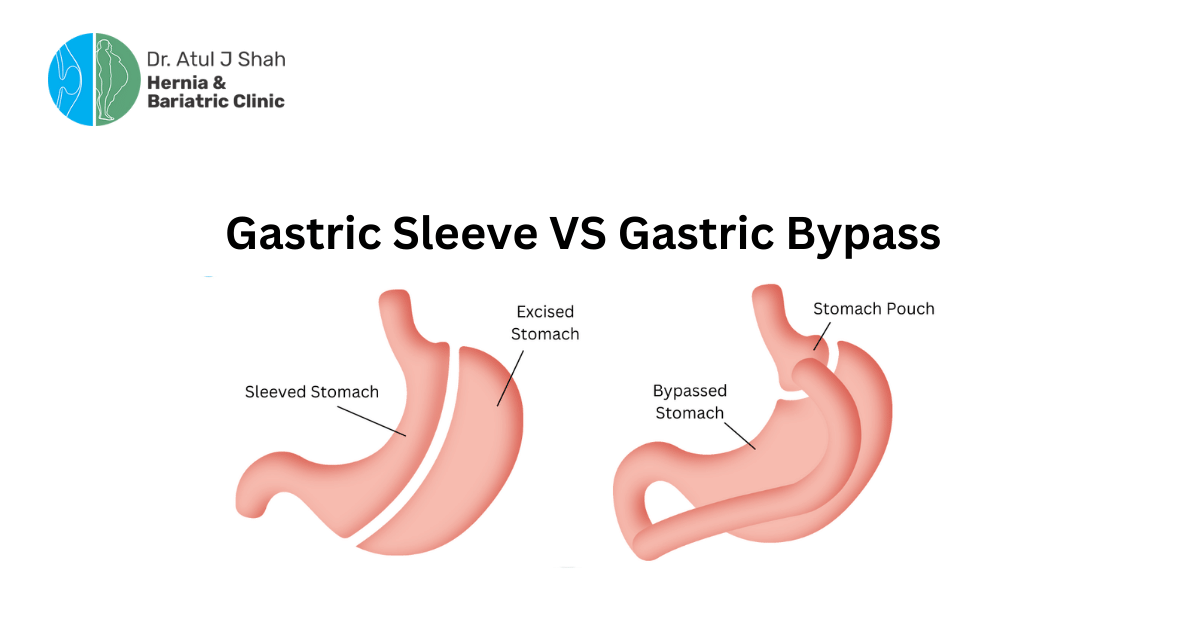Obesity is a real problem in modern society and is caused by various factors such as a sedentary lifestyle, food habits, genetics, hormonal imbalances, etc. While it is easy to gain weight, losing it becomes a real problem. If you are someone who is struggling with obesity despite all efforts, your healthcare physician may suggest bariatric surgery, also known as weight reduction surgery.

Types of Bariatric Surgeries
Individuals contemplating bariatric surgery for weight loss have various choices. Gastric sleeve surgery and gastric bypass surgery are two of the most popular treatments. There are notable distinctions between the two, despite sharing an identical objective.
The distinctions between gastric sleeve surgery and gastric bypass surgery will be covered in this article to assist you in making an informed decision. It’s crucial to go over your alternatives with your healthcare practitioner, though, especially when considering gastric sleeve vs gastric bypass.
What is Gastric Sleeve Surgery?
Gastric sleeve surgery involved eliminating a section of the stomach. It is also referred to as a vertical sleeve gastrectomy, which allows you to consume less food. It is the bariatric procedure that is most widely used globally.
Who Should Undergo Gastric Sleeve Surgery?
- Treating obesity is frequently advised for those whose body mass index (BMI) is greater than 40.
- Individuals who have at least one current medical issue, such as type 2 diabetes, high blood pressure, or obstructive sleep apnea, and a BMI of 35–39.9.
- Individuals with uncontrolled type 2 diabetes who have a BMI of 30-34.9%.
What to Expect After Gastric Sleeve Surgery?
Within 12 to 18 months after surgery, a patient might anticipate losing 60%–70% of their excess body weight when combined with the suggested dietary and lifestyle adjustments.
What happens in gastric sleeve surgery?
The way gastric sleeve surgery operates is by excising most of the stomach. By holding less, the new, smaller stomach in the shape of a banana helps you consume fewer calories overall.
The fundus, a rounded, higher part of the stomach where the majority of the “hunger hormone” Ghrelin is produced, is also removed during the treatment. The operation can also increase fullness and decrease hunger by lowering ghrelin levels.
The Procedure for Gastric Sleeve Surgery
- Gastric sleeve surgery is performed with a laparoscope.
- The actual operation takes forty to seventy minutes.
- You will be rendered unconscious and put under general anesthesia prior to the operation. You won’t recall anything or experience any pain.
- Your abdomen will be divided into two to five small incisions so that the laparoscope and other surgical instruments can pass through.
- After that, your stomach will be mostly (around 80%) removed by the surgeon. With the help of surgical staplers, the majority of the stomach is divided and sealed, resulting in the formation of a long, narrow tube, or “sleeve.”
- After surgery, you will probably need to spend at least one day in the hospital. Two to four weeks are needed for the whole gastric sleeve healing process.
Adverse Affects of Gastric Sleeve Surgery
Possible drawbacks or consequences from gastric sleeve surgery include:
- Reflux or heartburn
- Skin that is loose or sagging due to weight loss
- Deficiencies in vitamins and nutrients caused by inadequate dietary consumption
- Formation of a stricture (thinning of the sleeve)
What is the Cost of Gastric Sleeve Surgery?
A cost estimate for any operation, including gastric sleeve surgery, is hard to come by until you consult with your surgeon.
Where can you get sleeve surgery?
You can visit Dr. Atul Shah, a Gastroenterologist in Ahmedabad, to do your gastric sleeve surgery.
What is a gastric bypass?
Another most effective and common method for losing weight is gastric bypass, also known as Roux-en-Y gastric bypass. Gastric bypass helps obese people lose weight by changing the way the body breaks down and digests food.
But compared to gastric sleeve surgery, it has a slightly higher risk of complications and requires a longer recovery period.
Who Should Undergo Gastric Bypass?
- It is usually advised for people over 45 who have tried and failed at other weight-loss techniques.
- After surgery, most patients can anticipate losing between 60% and 80% of their excess body weight in the first 12 to 18 months.
What Happens in Gastric Bypass Surgery?
In essence, gastric bypass reduces the size of your stomach, which makes it harder to eat a lot and alters the way food is broken down. Additionally, it modifies gut hormones to prolong feelings of fullness.
How is the Gastric Bypass done?
- For surgery, you will be put under general anesthesia, much like with the gastric sleeve. It takes two to four hours to do the entire treatment.
- The surgery can be carried out openly, requiring a big incision to be made to open your abdomen, or laparoscopically.
- During gastric bypass surgery, the upper part of the stomach is divided into a small, egg-sized pouch, and it is connected directly to the small intestine. By doing this, your food bypasses the remainder of your stomach and the upper portion of your small intestine.
- After a gastric bypass, you absorb fewer calories from the food you eat because the beginning of the small intestine absorbs a lot of nutrients.
- After surgery, most patients spend two to three days in the hospital. The recuperation period following a gastric bypass is three to six weeks.
Adverse Affects of Gastric Bypass Surgery
There are higher risks and potential adverse effects with gastric bypass surgery due to its complexity compared to gastric sleeve surgery. Some of them include:
- More susceptible to nutritional deficits than with the gastric sleeve
- Possibility of getting a colon blockage
- Possibility of ulceration
- Loose or sagging skin
- Gallstones
What is the Cost of Gastric Bypass Surgery?
The price of a gastric bypass varies according to the complexity of the case. You should meet with a gastric bypass surgeon to get an exact estimate after a proper consultation.
Where can I go for Gastric Bypass Surgery?
You can meet Dr. Atul Shah, a popular surgeon for gastric bypass surgery in Ahmedabad.
Gastric Bypass or Gastric Sleeve: What Is the Best Treatment for You?
The optimal kind of bariatric surgery for you will depend on:
- Underlying medical issues
- Your weight as of right now
- Your health background
- The amount of weight you must shed
Your bariatric surgeon can help you determine which treatment option is ideal for you by going over the advantages and disadvantages of each with you during your consultation.
Conclusion
Both gastric sleeve and gastric bypass surgery are safe and efficient methods of losing weight. With gastric sleeve surgery, almost 80% of your stomach is removed during a minimally invasive procedure. On the other side, gastric bypass is a two-step process that allows food to skip the stomach by joining a little pouch of the stomach to the second segment of your small intestine.
Both have advantages and disadvantages. Due to its simplicity, gastric sleeve surgery is more common and typically has fewer adverse effects. Nonetheless, gastric bypass surgery might be more advantageous for people who need to lose a large quantity of weight.
See Dr. Atul Shah if you are thinking about having weight loss surgery, as an experienced bariatric surgeon can assist you in making that decision for your better health.

